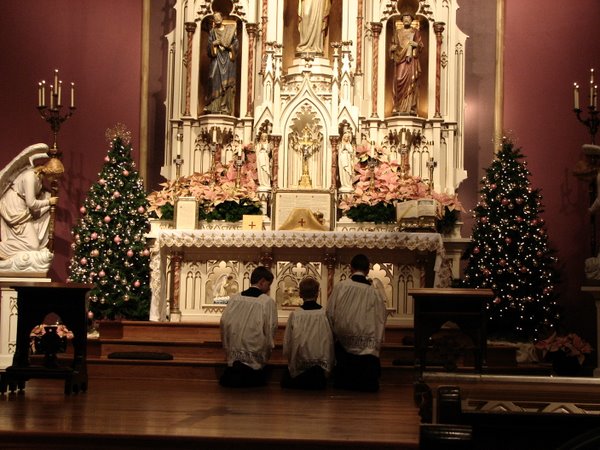In Preparation For The Feast Of Christ The King

This Sunday, October 28th, is the traditional Feast Of Christ The King. On that day, my youngest son, Maximilian, will receive Our King in the Most Blessed Sacrament for the first time.
With great joy, this young man is preparing to receive his Lord! As this week will be rather full, I will be undertaking a "blog fast" for the rest of the week. Time for quiet reflection, a few extra moments with Max and the excitement that will accompany the arrival of the grandparents, the great-grandmother and dear uncle.
Be assured, there will be pictures galore and many happy memories to share. We are postponing the large gathering we had planned for this Saturday. The weather is not going to cooperate...so the bonfire and hayride are a "no go". A quiet family gathering on Saturday will not only suffice, but will help keep the "excitement" in perspective with this Holy Sacrament.
May your week be blessed as you all prepare for this most lovely Feast Day. Here is an excellent article from Spero News on the importance of keeping the traditional date for the Feast Of Christ The King:
For Christ the King
The Traditional Rite places the feast on the Sunday preceding the Feast of All Saints. This is to show that Christ rules as King most fully over the saints.
Thursday, October 04, 2007
By Brother Andre Marie
Sunday, October 28 is the Feast of Christ the King. That is, it is the feast in the 1962 Calendar followed by those who adhere to the “extraordinary form” of the Roman Liturgy. The feast is celebrated on November 25 this year in the Novus Ordo calendar. Why the difference?
The Traditional Rite places the feast on the Sunday preceding the Feast of All Saints. This is to show that Christ rules as King most fully over the saints. He “triumphs in all the Saints and in all the Elect,” to use the exact words of Pope Pius XI, who instituted the feast in 1925. At the same time, the prayers of the Old Rite emphasized the reign of Christ in society, here and now. The pope wanted the laws of nations conformed to the Kinship of Christ. The New Rite, which also keeps the feast on a Sunday, puts it on the last of the liturgical year. Some have inferred from this change, and from the New Rite’s removal of certain prayers for the reign of Christ over nations (and not merely the hearts of men), that Christ’s Kingdom should be seen as a future, eschatological reality, not something to be actually implemented in temporal civil society.
When he instituted the Feast of Christ the King, Pius XI did so specifically to memorialize the true teaching on our Lord’s social Kingship. He promulgated the feast in his encyclical Quas Primas, where the doctrine of Christ the King was wonderfully summarized. We would do well to give that magisterial work a read, the better to understand the feast and its doctrine.
Pope Pius XI said that “Men must look for the peace of Christ in the Kingdom of Christ.” In my humble opinion, it is because that message went largely unheeded — Hamish Frasier called the encyclical “the greatest non-event in the history of the Church” — that we now live in an insufferable geopolitical hell. We can’t say we weren’t warned.
To those who say that Christ’s Kingdom is not of this world and, consequently, religion and politics must be separated, Pius addressed these strong words: “It would be a grave error, on the other hand, to say that Christ has no authority whatever in civil affairs since, by virtue of the absolute empire over all creatures committed to him by the Father, all things are in his power.”
After saying that our Lord’s dominion extends over all men, believers and non-believers, the pope goes on: “Nor is there any difference in this matter between the individual and the family or the State; for all men, whether collectively or individually, are under the dominion of Christ. In him is the salvation of the individual, in him is the salvation of society. ‘Neither is there salvation in any other, for there is no other name under heaven given to men whereby we must be saved’” (Acts 4:12).
Michael Davies, in his brief study, The Reign of Christ the King, summarizes the Church’s traditional social doctrine: “The Church’s teaching is that the State has an obligation to render public worship to God in accord with the teachings of the True Church, the Catholic Church, and positively to aid the Catholic Church in the carrying out of her functions. The State does not have the right to remain neutral regarding religion, much less to pursue a secular approach in its policies. A secular approach is by that very fact an anti-God and an anti-Christ approach. This unequivocal teaching was summarized very clearly by Pope St. Pius X, who, in his encyclical Vehementer Nos, condemned the principle of the separation of Church and State as ‘an absolutely false and most pernicious thesis.’”
Inasmuch as the Kingship of Christ has existed in nations not ruled by monarchs, a true Christian social order can be established in our American Republic. In the period roughly contemporary with that of our War between the States, there was a Catholic republic in Ecuador headed by Venerable Gabriel Garcia Moreno, a man called “the greatest Catholic statesman since the Middle Ages.” (Our Lady of Good Success, in her seventeenth-century revelations to Blessed Mariana of Jesus, prophesied him as a “truly Catholic president” who would receive the palm of martyrdom.) Moreno’s motto was to the point: “freedom for everyone and everything except sin and evil.”
The 1930’s Austrian republic of Pius XI’s close collaborator, Engelbert Dollfuss, provides another example, as does Antonio Salazar’s Republic of Portugal.
What would it look like if we had a Catholic America where Christ ruled as King?
If the U.S. becomes a Catholic nation (a nation in which the vast majority of the citizenry is Catholic), then the constitutional system would allow us to enshrine certain Catholic principles in the law of the land. On the positive side, the federal Constitution would recognize the most fundamental papal teaching on the matter of politics, namely, that all power is from God, not from the people. (This is true no matter how leaders are actually chosen.) Additionally, there would be laws that protect the family, such as a tax system which does not penalize, but, rather, rewards parents with large families by giving them tax breaks. Marriage would be recognized to be indissoluble and (as if it needed to be said!) exclusively between one man and one woman. Government would respect the principle of subsidiarity, which would make for smaller, less intrusive, bureaucracy. On the negative side, abortion, birth control, pornography, and sodomy would be outlawed.
Because ours is a federal system, the states themselves can implement such a social order in their respective constitutions. Thus, for example, Rhode Island could fully recognize the social rights of Christ the King, while the other states still lagged behind. This was the case in the Catholic cantons of Switzerland, each of which was a confessional Catholic State.
We must be realistic, but we must not lose sight of the ideal. A lot will have to happen to make all this possible, and it will likely be implemented only very gradually, as Dollfuss attempted to do in Austria (before the Nazis murdered him). Besides the grace of God, we will need enough of our countrymen to embrace the Catholic Faith to bring about our Lord’s full Kingship here. For that to happen, the bishops, lower clergy, and faithful will have to believe and profess all the truths of the Faith more boldly. An elite of clergy, religious, and faithful will have to live the interior life deeply, fortified by an authentic liturgical piety. All the while, it will take Catholics with fortitude to combat the unfortunates who oppose Christ’s reign — those inside and outside the Church.
As Joseph de Maistre pointed out, we must not repose our hope in a written constitution (we haven’t used the one we have now for decades!), but in men who have formed their consciences according to the teachings of Holy Mother Church. We can begin by getting to know the teachings of the popes in this matter and impressing them on our children.
Where Christ is King, Mary is Queen, and since she is the “Dawn” who precedes the coming of the “Sun of Justice” — as the Immaculate Conception heralded the Incarnation — she must pave the way for Christ’s rule. October, the Month of the Holy Rosary, is a queenly Marian preparation for Christ’s Kingship. That is the way it happens in the Church calendar and that is the way it will unfold in time. With the grace of God and the weapon of the Holy Rosary, we will clear the way for Christ the King!
Cor Iesu adveniat regnum tuum. Adveniat per Mariam! Heart of Jesus, Thy kingdom come! Thy kingdom come through Mary!
Brother Andre Marie, M.I.C.M, Saint Benedict Center












No comments:
Post a Comment